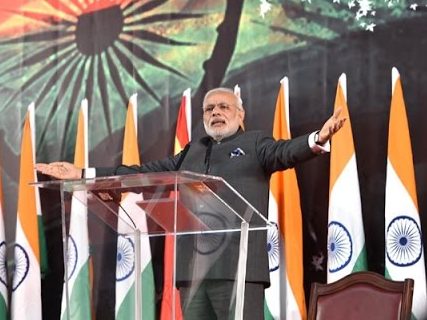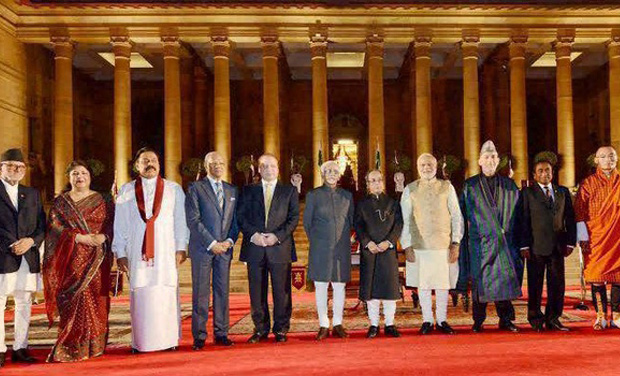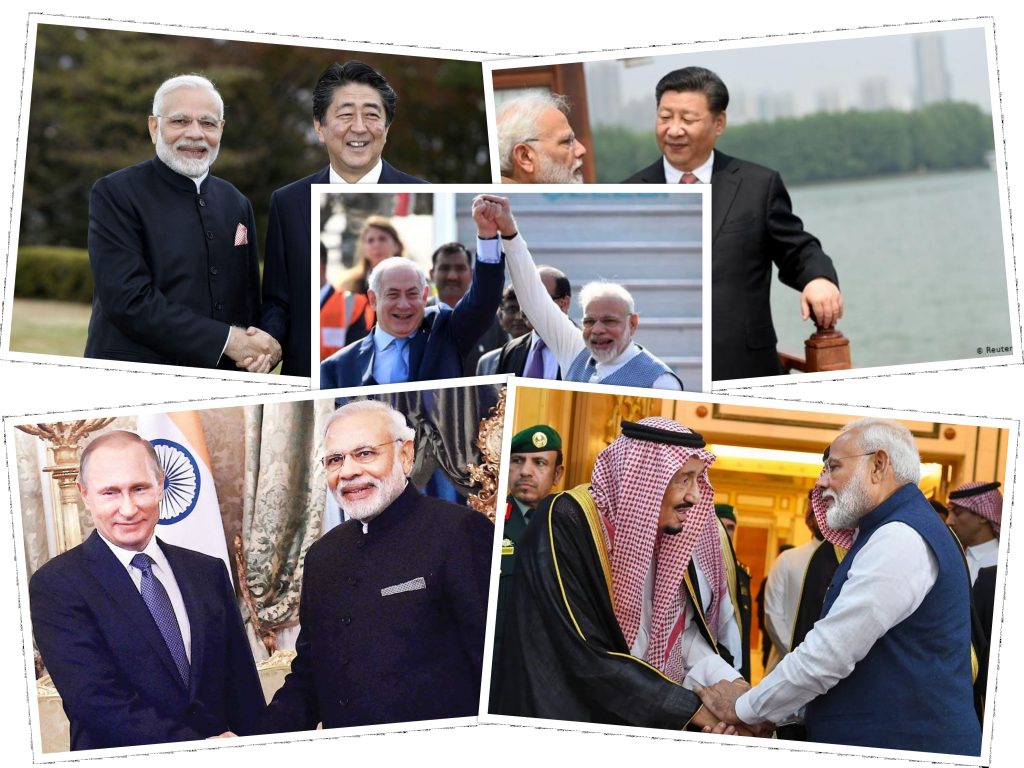
Abstract
With 2014 elections bringing about a new government at Delhi led by Prime minister Narendra Modi was groundbreaking in many respects, as for the first time in 40 years a party in India received an absolute majority and the elections were fought on a presidential-style where leadership was one of the essential factors that determined the outcome of the results in favour of Narendra Modi. PM Modi was more known for his administrative reforms & economic management as the CM of Gujarat, but little was known about his abilities in managing foreign policy.
But to everyone’s surprise PM Modi has taken up a keen interest in foreign affairs and has left his mark in shaping the Indian foreign policy in a new direction. He has infused a sense of self-confidence, risk-taking attitude and has ushered realism into India foreign policy. Undertaking surgical strikes against Pakistan after the Uri attack shattered the myth of Pakistan’s nuclear capability and has thrown open the possibility of India fighting a limited conventional war if need be. However, at the same time, there have been certain criticisms about his abilities to reach out to the smaller neighbouring countries such as Nepal who today are more aligned with China than before.
Introduction
Across several fields of endeavor, leadership has long been recognized in a concert of the foremost important variables influencing the success or failure of assorted activities, starting from military campaigns, to structure performance in business and management, to the character and quality of nation-state foreign and domestic policies. One of the earliest references to leadership with respect to foreign policy can be traced to Thucydides description of the Peloponnesian War which took place between Athens & Sparta, which highlighted the importance of leadership and their strategies in securing positive outcomes for the state. Similarly Machiavelli in his work The Prince who prescribes the quality of a good leader to lead a state towards glory, he says that a Prince must be both Lion and fox at the same time to meet the challenges that the state would come across.
When we look at Indian foreign policy we see it has been shaped by various factors such history, culture, geography, economic structure but one important factor along with these is the leadership and their vision, for instance, Nehru has left his imprint on Indian foreign policy in the form of Non Aligned movement which guided the Indian foreign policy during the cold war period. Similarly, during Indira Gandhi’s tenure, she gave a new direction to Indian foreign policy by signing the 20 years of a friendship treaty.
During 1990- 2014 we see that role of leadership had lost significance to a certain extent due to coalition politics domestically apart from few initiatives such as Gujaral’s Doctrine and Vajpayee’s decision to declare India as a nuclear power. But with the outcome of 2014 elections, where people gave an absolute mandate to Modi led BJP, it brings the focus back to analyzing the role of leadership in shaping the current Indian foreign policy.
Since coming to office in 2014 we see that foreign policy has been one of the key sectors where PM Modi has taken keen interest from the very beginning which can be seen with him extending the invitation to head of the states of SAARC for his swearing-in ceremony which in way sent out the message of his Governments direction to Indian foreign policy what is known as the Neighborhood First Policy, PM Modi also reflected his intentions of according primacy to South Asia by scheduling his first foreign visit to Bhutan when many were expecting him to visit one of the superpowers.

Literature Survey
Surupa Gupta (2019) reported that very few people had predicted the importance that would be given to Foreign policy by Prime Minister Modi, Modi as a personality has always polarized opinions about him throughout his political career; the same has carried out with respect to his foreign policies, where one section of analysts believe that there is nothing new in his foreign policy it is a continuation of the Preceding policies but it is being packaged well, whereas the other section of analysts feel that Prime minister Modi has brought major changes in the direction of Indian foreign policy where is has changed India’s image at a global level from a rule-taker to rule maker, has given more focus to economic diplomacy & muscular foreign policy.
Ian Hall in his book Modi & Re-invention of Indian foreign policy (2019) argues that PM Modi has used the Indian foreign policy to consolidate his dominant position in domestic politics. He has used Hindu nationalist ideology to foreign policy shaped by Indian civilizational ethos and there is a close link between domestic political decisions and its implication on India’s foreign policy as seen with respect to citizenship Amendment bill & revocation of special status to Jammu & Kashmir.
Prof Harsh V Pant in his work The Indian Foreign Policy: Modi Era (2019) says a voluminous literature has been generated within a short span of time under PM Modi which has forced even the critics to concede that something has shifted on the foreign policy front under Prime Minister Modi
Foreign policy assertiveness

“Domestic policy can only defeat us but the foreign policy can kill us”
– John F Kennedy
During his initial tenure PM Modi in spite of his electoral rhetoric’s tried to continue the policy of patience wait with respect to Pakistan, he also reached out to Pakistan as part of his neighborhood first policy when he made an unscheduled stop at Lahore and made a visit to then Prime Minister Nawaz Sharif & gifted a saree to Nawaz Sharif’s mother. But however, this Bonhomie couldn’t last for long as India witnessed the attack on its military base at Pathankot attack.
In January 2016 and in September 2016 India witnessed again attack its military base at Uri by Pakistan sponsored terror group, these attacks saw a strong response from the Indian side, here we see the shift in India’s policy towards Pakistan,security analysts say that unlike his predecessors, PM Modi has chosen to be more assertive when it comes to national security. As an example of this assertiveness, they point to India’s “surgical strike“ against suspected militant hideouts in Pakistan. Hence we see the shift from a traditional defensive policy towards a more assertive policy against Pakistan’s asymmetric warfare against India.
PM Modi further put pressure on Pakistan by raking up the human rights violation in Baluchistan region the biggest province of Pakistan, when he mentioned it in his Independence Day speech, which for the very first time an Indian Prime Minister had publicly criticized Pakistan’s action in Baluchistan, which many analysts sees as India’s counter-response to Pakistan’s strategy of accusing India of human rights violation in Kashmir.
Though this move received lukewarm response from other Nations, still it reflects the changing dynamics of India’s foreign policy from the Paradigm of idealism towards realism. The Indian government under PM Modi warned Pakistan that if it continued with its policy of bleed India through thousand cuts through sponsoring non-state actors to carry out terror attacks on Indian soil, India would go to the extent of cutting of Indus water which is the lifeline of Pakistan, in this regard PM Modi commented that “Blood & Water cannot flow together “. This important policy change is only possible under strong leadership and favourable domestic political conditions.
Global Push to India’s soft power
Another important aspect of PM Modi’s foreign policy has been building India’s image at a global level. Joseph Nye says “In the information age, it is often the side which has the better story that wins”. Modi government took necessary steps at the UN to declare June 21st summer solstice as International yoga day, put yoga on an international platform to re-emphasize the fact that India is the birthplace of yoga. These image-building efforts have certainly earned accolades for Modi. For example, in his first five-year term, he received numerous leadership awards, such as the Seoul Peace Prize, the Gates Foundation’s Global Goalkeeper Award, and the Kotler Presidential Awards.
Buddhism is another aspect of Modi government’s soft power this could be witnessed with respect by organizing many seminars on Buddhism by Indian council for cultural relations (ICCR), PM Modi made Buddhist Bhutan his first foreign visit as Prime Minister, and in August last year travelled to two major Buddhist shrines in Kyoto during a trip to Japan. In September, visiting Chinese President Xi Jinping was greeted in Ahmedabad with an exhibition on ancient Buddhist links between China and Gujarat – including a visit by the 7th-century traveller-monk Xuanzang. Modi government also began a series of symbolic gifts – saplings of the original Bodhi tree in Gaya – to East Asian nations. President Pranab Mukherjee carried a sapling to Vietnam.
A closer observation of PM Modi’s foreign policy according to some analysts are of the opinion that today India is on the verge of shifting away from its long-held policy of nonaligned movement
The most important aspect PM Modi’s soft power push has been engagement with the Indian diaspora. PM Modi’s visits to other countries have been characterized by organizing events to engage Indian diaspora on a large scale, for instance, his first visit to the USA was marked by the event organized to engage the Indian diaspora at madison square garden, similarly, PM Modi has engaged diaspora in UAE, Australia. PM Modi through these events has made an attempt to establish a link between India and Indian diaspora as he said: “you can take an Indian out of India, but not India out of an Indian “.
The count of the Indian diaspora has increased 10% from 15.9 million in 2015, making it the largest in the world, according to the UN’s International Migrant Stock 2019 released on Wednesday. It now comprises 6.4% of the total global migrant population. In 1990, India was behind Russia and Afghanistan as a source of international migrants at 6.6 million with Russia sending 12.7 million abroad and Afghanistan 6.8 million. In 2019, Russia fell to the fourth position behind Indian, Mexico and China with 10.5 million migrants. Diaspora would play a very important role with respect to promoting India’s culture, bringing in investments into India, also act as a pressure group in their resident countries to bring favourable policies in India’s favour, for example, the 2005 Indo- US nuclear deal can be attributed to a certain extent to the role played by the Indian diaspora.
NAMO Shift away from NAM?
A closer observation of PM Modi’s foreign policy according to some analysts are of the opinion that today India is on the verge of shifting away from its long-held policy of nonaligned movement, today we see India developing closer relations with the USA. Since PM Modi has come to power we see that there has been an upswing in the Indo-US relations, under Modi’s regime in last three years Indo-US defence relations have grown from mere $5bn to $15bn, USA has accorded India STA-1 status which is usually accorded only to NATO allies & signing of the foundational agreements such LEMOA has pushed India and USA towards a strategic collaboration.
However it would be wrong to say that Modi government has debunked India’s tradition NAM policy, we see that under Modi government NAM is being pursued as strategic autonomy, building relations with all superpowers based on India’s national interest, this can be substantiated by the fact that PM Modi approved the purchase of S-400 missiles from Russia despite US threatening to impose CAATSA provisions against India. Hence it would be wrong to say that the foreign policy under PM Modi has watered down NAM.
Inducing Pragmatism into Indian foreign policy
One area where PM Modi has completely altered the foreign policy direction is with that of Israel. The previous governments and leaders had kept closed-door relations with Israel keeping in mind the sensitivities associated with Palestine people. In regard to this, no Indian Prime Minister had officially visited Israel. However PM Modi took the bold step of De-hyphenating the relations between Israel- Palestine. PM Modi became the first Indian Prime Minister to set foot on Israel. This decision was based on the growing relations between India- Israel in recent years in sectors such as defence, dry land agriculture, space collaboration, water conservation which are vital for India’s security and developmental needs. This was a huge step and one can say that all these years India had treated Israel as a mistress but under PM Modi India has openly acknowledged Israel as the wife!
Many analysts have applauded the Modi government’s move given the fact that many Arab countries themselves share closer relations with Israel; it was time that India start to look Israel from the perspective of national interest rather than from the lens of morality.
Conclusion
PM Modi surprised most of the analyst when he came to power by giving sufficient prominence to foreign policy an area which many considered as not his forte. According to Ashley Tellis Modi has impressed him with his quick learning skills when it comes to International relations, his role in transforming India’s relations with Gulf countries by especially Saudi Arabia, UAE through promises of economic and political benefits & weakening of these countries support to Pakistan on religious grounds has been one of the hallmarks of Modi governments foreign policy achievements.
The biggest achievement or credit to PM Modi with respect to India’s foreign affairs has been bringing in dynamism, realism. He may be the only Prime Minister after Nehru to take a keen interest in International affairs and create a niche for India at the global level.
The biggest achievement or credit to PM Modi with respect to India’s foreign affairs has been bringing in dynamism, realism.
Beyond these geostrategic aims, Modi has focused at least a third of his foreign travels on advancing Indian economic aims. For the most part, these have concentrated on attracting foreign investment to India. By addressing complaints about the ease of doing business and by removing obstacles to investments, Modi has attempted to woo investors in countries as disparate as China, Japan, the United Arab Emirates, the United Kingdom, Ireland, Canada, and the US — not to mention the myriad middle powers in continental Europe.
One cannot deny that PM Modi’s enthusiasm with respect to foreign affairs has added sheen and vibrancy to India’s foreign policy has given much-needed vigor to Indian diplomats, he has been able to arouse the Indian diaspora across the world & has attempted to create an image and niche for India at the global high table.Hence it’s we can say its beyond doubt thatPrime Minister Modi has modified the Indian foreign policy for the better and today India is making strides towards becoming a leading power under a pragmatic leadership of Prime minister Modi .
(Author is a student of Master of Public Policy at the National Law School of India University. He is interested in politics, leadership and election strategies, and international relations. Opinions expressed are author’s own)
References
- https://oxfordre.com/internationalstudies/internationalstudies/view/10.1093/acrefore/9780190846626.001.0001/acrefore-9780190846626-e-255
- https://www.theguardian.com/world/2014/may/26/narendra-modi-sworn-in-india-prime-minister
- https://www.orfonline.org/research/india-foreign-policy-assertive-face-challenges-old-new/
- https://indianexpress.com/article/india/indias-foreign-policy-has-become-vibrant-assertive-chinese-think-tank-5046174/
- https://thewire.in/books/review-bharat-karnad-narendra-modi-foreign-policy
- https://indianexpress.com/article/opinion/columns/india-china-border-dispute-modi-foreign-policy-c-raja-mohan-6577973/
- https://www.firstpost.com/india/india-is-largely-responsible-for-the-nepal-mess-new-delhi-must-show-political-will-in-resetting-ties-and-give-nepal-the-brexit-it-seeks-8635831.html
- https://www.orfonline.org/research/book-launch-indian-foreign-policy-the-modi-era-by-prof-harsh-v-pant-50527/
- https://core.ac.uk/download/pdf/220709505.pdf
- https://www.researchgate.net/publication/326432022_INDIA’S_SOFT_POWER_DIPLOMACY_UNDER_THE_MODI_ADMINISTRATION_BUDDHISM_DIASPORA_AND_YOGA
Masters of Public Policy, National Law School of India University, Bengaluru

Excellent post, clearly and well explained Modi’s Indian Foreign Policy